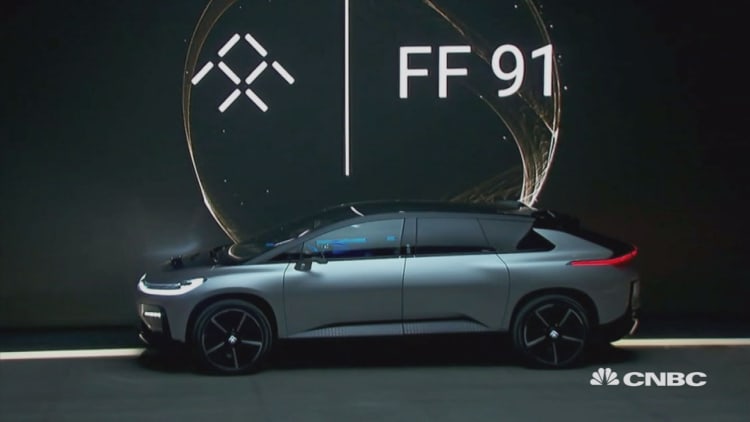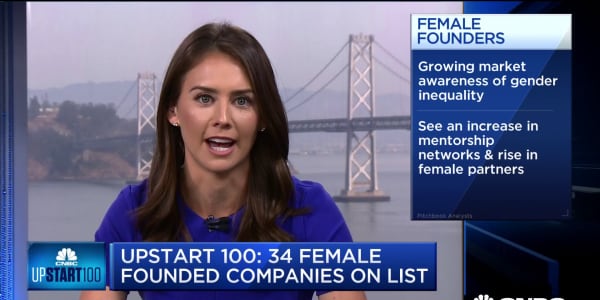
The electric vehicle market is currently dominated by Tesla Motors, which reached a market cap this week of $48 billion. But as EV sales grow — Tesla pulled in more than $7 billion in revenue last year and just had its best quarter — there are several EV start-ups aiming to catch Elon Musk's EV company, and they share a common source of support: Chinese investors.
Chinese venture capital investors have poured more than $1.4 billion into electric vehicle and battery start-ups in the past three years, according to PitchBook, compared to $2.1 billion in total global venture capital funding for the sector.
"Tesla has a target on its back, not only from traditional automakers but also these start-ups," said Jeff Schuster, senior vice president at LMC Automotive, an automotive production and sales forecasting company. "But it'll be a challenge. Tesla now has critical mass and funding."
Though far more successful than these start-ups, Tesla does have one thing in common with competitors: the recent investment from China. It received an investment equal to $1.8 billion from Chinese messaging firm Tencent, when it purchased a 5 percent stake in Tesla shares. The investment makes the Chinese giant one of Tesla's largest shareholders, and is part of Tencent's pursuit of self-driving cars and electric vehicles, and it can open doors in China for Tesla.
Its EV rivals also lack one key ingredient: Elon Musk.
Tesla EV rivals worth watching
"While each of those start-ups are run by individuals who don't shy from the spotlight, none of those companies are headed by a successful entrepreneur who is continuously challenging, and changing, the world like Elon Musk," said Michael Harley, executive analyst for the vehicle valuation and research company Kelley Blue Book.
Faraday Future
One well-known EV start-up funded entirely by Chinese investors is Faraday Future. It's backed by Chinese billionaire Jia Yueting, founder of the conglomerate LeEco. Faraday plans to build its first EV, the FF 91, in a factory under construction in Nevada (where Musk is building his battery gigafactory).
Tesla has a target on its back, not only from traditional automakers but also these start-ups.Jeff Schustersenior vice president at LMC Automotive
Faraday hopes to bring the car to market next year, but the company has faced widely reported financial troubles, in line with its parent company's balance-sheet challenges. Yueting took a Jeff Bezos-like approach to expansion, sacrificing profits to move into new areas, including electric cars and entertainment, as well as to make a $2 billion acquisition of TV maker Vizio. Faraday says its plans are proceeding in Nevada, but the state has shown concern, with its Treasurer telling the Chinese press late last year that Yueting ran out of money.
The company recently scrapped plans for a second car facility that was to be built in California, but parent LeEco did raise $2 billion in funding in January. The FF 91 is a large crossover with James Bond-like features, such as facial recognition technology and a retractable LiDAR sensor in the hood to measure distances when it self-parks. The FF 91's battery pack, developed in partnership with LG Chem, is said to allow a range of almost 380 miles — more than most Americans drive in a week and a longer range than any Tesla. Top versions of the FF 91 will have 1050 horsepower and 0 to 60 acceleration in 2.39 seconds, according to the company. If true, that would make it almost as quick as the Tesla Model S, the current record-holder as the quickest four-door production vehicle — it hit 60 in 2.28 seconds earlier this year in testing by Motor Trends.
Lucid Motors
Yueting is also among the Chinese investors in Lucid Motors, an EV start-up founded by a former Tesla executive, which has received more than $130 million in venture funding. Lucid's first vehicle, the Air, is a sedan to be manufactured in Arizona. It has an enormous interior and two trunks (with total volume similar to a four-person hot tub). The base 400-horsepower model will have a 240-mile range and start at $52,500, after federal incentives. Upmarket versions will exceed $100,000 and feature larger battery packs, enabling more than a 400-mile range and a 2.5-second run to 60, according to the company. Lucid plans to start manufacturing in the first half of 2019, and produce 10,000 models its first 12 months of production. The Air seems to be a very close match to the Model S but is likely to undercut it in base pricing. Also, initial reviews note the Lucid's interior is more luxurious than the Tesla, with higher-quality finishes.
Other Chinese investors in Lucid include venture capital firm Tsing Capital and state-owned Beijing Automotive. But it also has Venrock, the venture-capital arm of the Rockefeller family, and Japanese conglomerate Mitsui, among its investors. Due to Yueting's notoriety, the company has stressed that it is an independent U.S.-based company. Chief technology officer Peter Rawlinson, who was previously chief engineer on the Tesla Model S, has also stressed that Yueting is a minority investor, and the investment LeEco made is already complete. The company has raised $130 million in funding, according to PitchBook.
Lucid has experienced management upheaval. It's been without a CEO since founder, Bernard Tse, a former vice president at Tesla, left in late 2015 after friction with Beijing Automotive, according to some reports. But it has avoided the funding issues Faraday is facing. David Salguero, Lucid's marketing manager, said the company is currently raising Series D funding, and the effort is going well. "We are on track to begin manufacturing the Lucid Air in Casa Grande, Arizona, in the first half of 2019," he said.
Fisker Automotive
Another Tesla challenger became notorious for being among the failures funded by a U.S. government loan-guarantee program. The renewable energy loan program managed by the Department of Energy became a lightning rod of criticism during the Obama presidency when some of its big bets went belly-up, including those to solar-panel maker Solyndra and carmaker Fisker Automotive. Fisker filed for bankruptcy in 2013, but now it's backed with Chinese money. The company's assets were purchased by Chinese auto parts company Wanxiang Group and renamed Karma Automotive.
The original Fisker Karma — a hybrid plug-in luxury sports sedan that also has roof-top solar panels — was sold in the United States between 2011 and 2012. It won praise for its gorgeous low-slung styling, but it had a cramped interior and was plagued by quality-control issues, including a recall over concerns its batteries would catch fire. An updated version of the original sedan is being relaunched as the Karma Revero and is expected to be priced at $130,000. Jim Taylor, the chief revenue officer for Karma Automotive, said the company is doing final quality testing and has not shipped any cars to dealers yet, though orders are confirmed. The company plans to sell a few hundred cars a year, starting within three months.
As a hybrid, not a fully electric vehicle, the Revero can refuel at any gas station. So while it lacks some of Tesla's high-tech features, it avoids "range anxiety" — the concern you might run out of juice far from a charging station.
Nio
All Teslas have been fast — from the small Roadster, which could accelerate 60 miles per hour in only 3.7 seconds to the massive Model X, which can do the deed in as little as 2.9 seconds. Musk's company even has what it is calling a "ludicrous mode" feature. But Tesla doesn't have a monopoly on speed. Chinese-funded start-up Nio (formerly NextEV), which has offices across the world, including California, Germany and China, generated buzz late last year when its limited-production EP9 sports car lapped Germany's famed Nürburgring race track faster than any other electric vehicle. The EP9 made more news this February when it set an autonomous driving record by circling a test track in Texas at 160 miles per hour without input from a human driver.
Nio is also developing a family-size vehicle, called EVE, designed to make commuting better. Padmasree Warrior, CEO of Nio's U.S. operations — who is also a board member at Microsoft and former CTO of Cisco Systems — has said that EVE is slated for production in 2020 and will feature artificial intelligence to enable autonomous driving. Warrior is also chief development officer for the global parent company. She noted that the concept vehicle is designed as "living space" that moves — allowing passengers to work or even sleep while the car guides itself to their destination. This interior flexibility — complete with folding tables and reconfigurable seating — separates it from current Tesla offerings.
Chinese internet provider Baidu recently made a reportedly $600 million investment in Nio's parent company. The company has raised $1.1 billion in two rounds of funding, according to an estimate from PitchBook, making it the most-funded EV effort backed by Chinese investors: The two deals are the largest given to any company in the EV sector.
Tesla has successfully launched a high-end sports car, a luxury family sedan, and a large crossover and is set to begin selling its first mainstream offering — a smaller family car, starting at $35,000 — later this year. But it faced near-bankruptcy in its early days, and in 2008 Musk said it "narrowly survived."
Market outlook
LMC Automotive's Schuster said the long-term prospects for Tesla (which began turning a profit only last year) are still debatable, as large mainstream manufacturers like GM and BMW make inroads into the EV space. Schuster noted that mainstream manufacturers have an appetite for strategic acquisition. Absorbing or partnering with start-ups such as these could provide useful technology as well as an image-boosting shot of Silicon Valley cachet. Ford recently invested $1 billion in robotics company Argo to spur autonomous car efforts. Early self-driving car efforts from the traditional automakers have scored higher in independent studies than those from Tesla, Uber and Alphabet's Waymo.
More from Upstart 25:
Beyond Bezos and Musk: The surprising people CEOs worship
Trump debunked: Start-up founders want more regulation, not less
Trump, listen up: 3 ways start-ups could fix America's broken health-care system
"One could argue that Lucid, Faraday Future, Karma, Nio and all of the countless others aren't in this to turn profits," Kelley Blue Book's Harley said. "Most are simply trying to demonstrate viable electric vehicle technology that puts them in a position to be purchased by an automaker that needs to meet ZEV (Zero Emission Vehicle) regulations."
The Trump administration is relaxing mileage standards set under President Obama at a time when trucks, SUVs and crossovers are already dominating sales of passenger cars in the United States. But the California Air Resources Board recently voted to keep the ZEV regulations it and 12 other states adhere to. Even if Trump reverses federal emissions policy, ZEV standards will still guide a third of the U.S. marketplace — too big a slice for automakers to ignore.
Tesla might face less potential for takeover than newer start-ups due to its size. It just had its best quarter ever for new car deliveries, and it recently achieved a $48 billion market cap — that's now higher even than Ford, a company 100 years older.
— By Joe D'Allegro, special to CNBC.com





